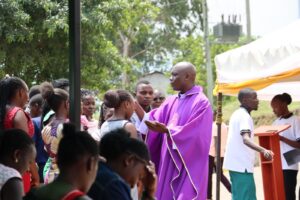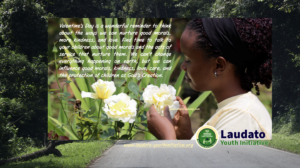Laudato Voices.
As the world prepares for COP30, the conversation around climate action is shifting. No longer is it enough for corporations to simply offset their carbon footprints with token tree-planting campaigns or distant carbon credits. The call now is for deeper engagement, where businesses integrate climate justice, community impact, and ecological integrity into their core operations. Last year our voice for Cop29 was
“The international response to the climate crisis needs to bridge the gap between Cop summits and the experience of those who face its consequences. It must ignite hope for a climate-resilient generation” Read full article
With our approach to climate action is deeply rooted in faith, guided by the conviction that its is everyones moral responsibility to ignite hope among young people. We believe in empowering the youth to lead, exploring science and innovation for sustainable living, and investing in mentorship to cultivate a generation of future-ready leaders what we are known for as “Stewards of the Future” a notion that defines our pathway to reimagining a sustainable future. It is a mindset shift and a global reality that also resonates with Uganda’s local realities. With rising temperatures, deforestation, and a youth population disproportionately affected by climate disruption, the time has come to rethink corporate climate action within a distinctly Ugandan context.
This vision is especially critical in our Country Uganda, where a rapidly growing youth population faces the realities climate Change. A fact that points to the reality that the future of our youthful Country depends on how we act today and how we equip the next generation to be good (Stewards of the future) and adopt the mindset shift that could inspire young people to be resileint and enage in activities that inspire hope for creation with courage, and conviction, that they can be the change they want to see in future but also be part of the decisions that will shape their preferred future. This is not only true for Uganda or Africa, but for the world at large, because the reality is the global climate crisis now demands localized, value-driven leadership as a way to form young to become the change makers and bearers of hope.
Corporate Offsetting in Perspective: Not Just Numbers, but Impact
its know days Internationally that many corporations rely on carbon credits to offset emissions, investing in reforestation or renewable energy projects, often in the Global South. But as highlighted by The Nature Conservancy, the real question isn’t whether credits exist, but whether they are credible, effective, and equitable.
In Uganda, this means ensuring that projects funded through carbon markets don’t just serve to cleanse corporate consciences abroad but actually empower young people and local communities, improve biodiversity, and create green initiatives in the grassroots to build a culture of empowering to priories sustainable living and change life styles from tendencies that accellebrate climate change effects like poor waste management, excessive use of polythene bags etc to responsible lifestyles that can mitigate climate change, giving more attention to green initiatives, promoting green jobs and training eco ambassadors in institutions and communities who will put more empahisis on innovating for Agriculture.
The Laudato Youth Initiative Thoughts and approach emphaises: God, People and Planet First
As you may know at the heart of Uganda’s environmental grassroots response is the Laudato Youth Initiative (LYI). Grounded in the spirit of Pope Francis’ Laudato Si’—a call to care for our common home, the catholic social teachings, SDG13 while reflecting on Uganda’s environmental laws LYI provides a critical lens on the importance of educating communities on how climate action must be rooted in faith, culture and community values, climate justice practices, and long-term sustainability action programs that go beyond a one time good action towards the environment. For instance
“Tree planting should not be a checkbox exercise. If done it must be timed well, they must be nurtured to grow, documented for follow up, and owned by communities as a valueable asset to be cared for and utilized for the benefit of all,”
As we move around communities we see many people desiring to plant trees and actually many are planting the trees but the question remains how many care for them to growth? This is a challenge we are taking on challenging for ourselves to ponder on ways we can care for the trees we plant to maturity. If eachone of us could ask themselves how many trees can I count to have planted and cared for to growth each year? This is always a basis of our desernement on what we do in our Laudato Si Club because its not enough to just plant trees. More can be done, and now we want to challenges corporations to go beyond “greenwashing” and instead invest in local resilience, through supporting youth based initiatives as a way of investing for the future, financing agroforestry training, and creating opportunities for young people to become environmental leaders in their own right.
A Missed Opportunity or a Transformational Moment?
As we listened to the reading of the our Country’s national budget, it was reported that Uganda’s 2025/2026 budget has allocated a record amount of funding toward tourism and environmental preservation, an opportunity for both the government and private sector players to align tourism development with conservation. This is a good thing and the hope is it will be implemented in creative ways that will pave way to restoring Uganda’s 2.4 million hectares of degraded forest (NFA, 2024). This is not just an environmental imperative, it is an economic one. Forests contribute to 3.5% of Uganda’s GDP and power 88% of household energy needs. They are central to agriculture, water regulation, tourism, and even disease prevention, given that one in three emerging infectious diseases are linked to deforestation (UNEP, 2020).
We reimagine the path forward from Offsets to on-the-Ground Action through
Examples like the Laudato Youth Initiative’s small footprints that appeals for a recalibration of corporate climate responsibility where:
- Support local-led solutions is given priority and grassroots and national efforts invest in community nurseries, agroecology, and reforestation projects that are youth-led and community-owned.
- Integrate transparency by documenting, monitoring, and share the real environmental and social impact of communities offsets to inspires others to take action.
- Focus on education and long-term impact where work with Schools, Universities, Churches is given priority to build a generation of climate-literate citizens who not only plant trees but also protect them. Think locally and acting globally reflecting not only on tree planting as a solution but also exploring the many other diemensions of climate change and possible solutions in their means.
Toward an Equitable Carbon Economy
Many will tell you. Uganda doesn’t need charity—it needs climate partnerships rooted in climate justice. As the saying “give a man a fish and you feed him for a day, teach him how to fish and you feed him for a lifetime “which emphasizes the importance of teaching valuable skills over providing temporary solutions”. It highlights the idea that empowering young people with the ability to help themselves is more beneficial in the long run than simply offering a quick fix solutions for a long lasting challenge like Climate Change. As COP30 in Brazil comes this year, it will be good for local and international corporate actors to look beyond quick fix solutions, and instead co-create climate solutions for generations and with those on the frontlines of the crisis. eeping in mind the words of Pope Francis:
“Everything is connected. Concern for the environment thus needs to be joined to a sincere love for our fellow human beings.” — Laudato Si’ #91
As we all know now the future is not just carbon neutral, it is people-centered, locally grounded, and holds us all globally accountable. Pope Leo XIV has emphasized the urgency of climate action and the need for climate justice and peace in the world stating that the damage to creation undermines the well-being of all people. He has called for a move “from words to action” on environmental issues emphasising the involvement institutions of learning by acknowledging universities’ efforts to reflect on
“a possible reconciliation between public debt and ecological debt” – a theme recently highlighted in the message released for World Day of Peace. Read his full message.
References
- The Nature Conservancy. (2024). How corporations are using carbon credits responsibly.
- United Nations Environment Programme (UNEP). (2020). Preventing the Next Pandemic.
- National Forestry Authority (NFA), Uganda. (2024). Uganda Forestry Sector Report.
- Uganda Budget Speech 2025/2026 – Ministry of Finance, Planning and Economic Development.














